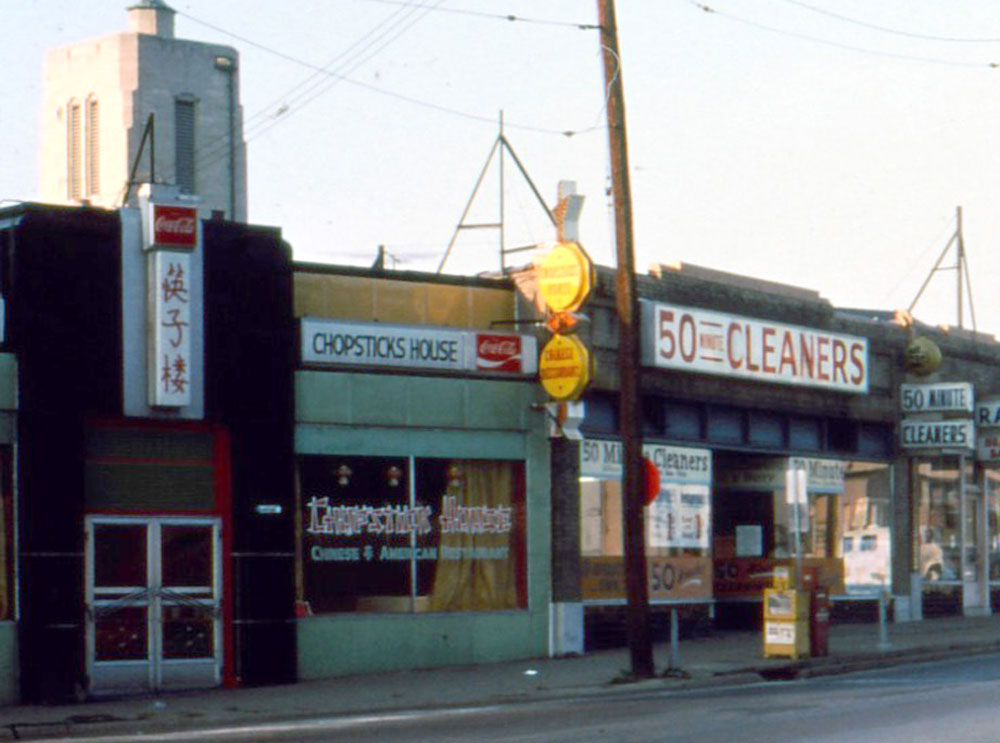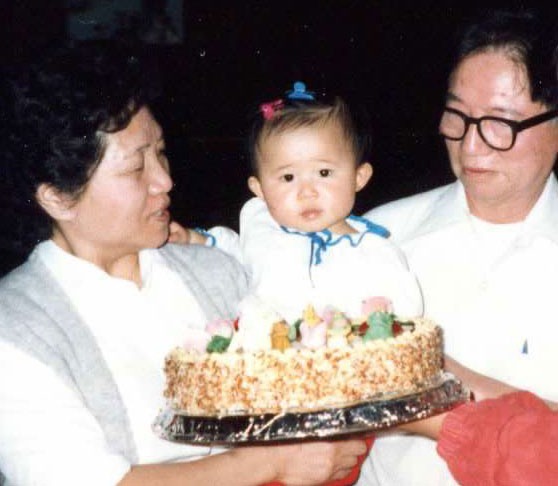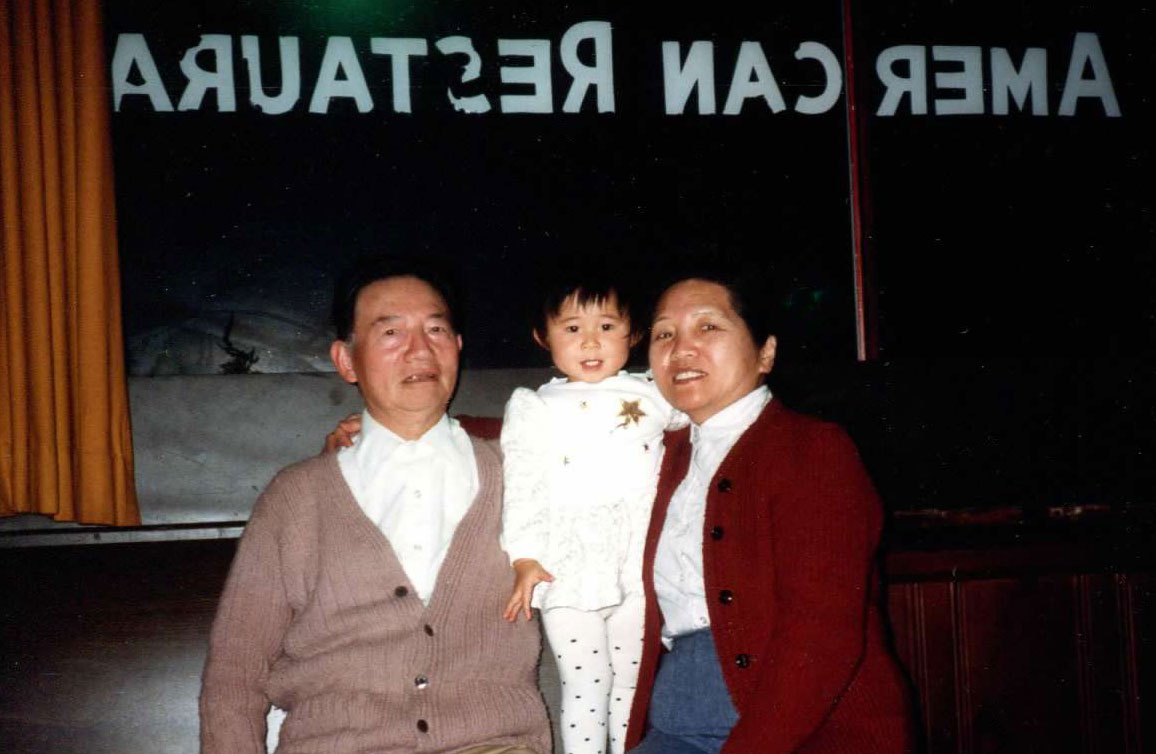Farica with her grandparents at Chopsticks House, the restaurant they opened in 1971

By Farica Chang, Managing Principal
My earliest memories include the clatter of chopsticks and the sound of sizzling wok oil in my grandparents’ Chinese restaurant in Maplewood, St. Louis, MO. There is a hazy visual of red, creaky, stiff vinyl chairs coupled with more sounds, bursts of bustling laughter. Ask me if those memories are my own or if they’re from my parents, and I would need to pause. I’m not sure, but the important thing is that I have them.
Legacy preservation for all is a mission deeply personal to me, woven into the very fabric of my family history. My grandparents were immigrants from Hong Kong. They waited a long time to be selected for the lottery that allowed them to migrate here; it wasn’t until they were in their 50s before they received approval. At that point, my grandfather had established himself as the head pastry chef at the Hong Kong Hilton, working his way up in the restaurant industry without any formal training. Their children were in their teens and even adulthood (my father was their oldest son). They were also new grandparents as my aunt had just had her first child. Coming to the United States at such an advanced age meant giving up the modest life they had built for themselves and starting over in a foreign land. Courageously, they made the decision to immigrate not for themselves but for their children and paved the way for future generations like me to have better opportunities.
With borrowed money, the whole family (my grandparents, all their children, and one grandchild) settled in St. Louis, MO, in 1969 at the suggestion of family friends. My grandfather worked as a cook at Trader Vic’s, except he was no longer the head chef. They saved austerely to not only pay off the debt incurred from making the journey to America but also to achieve their dream of opening their own restaurant.
In 1971, with the meager savings they accumulated, they purchased a restaurant at 7270 Manchester Road in Maplewood, MO for a bargain price. It was inexpensive for a reason. The location had no dedicated parking, was not in an appealing neighborhood with tourist attractions, and had no foot traffic to generate steady business.

For more than a year, the restaurant, Chopsticks House, did not do well. Patrons who stumbled upon it loved the food and service. By word of mouth, business slowly improved, but it wasn’t happening quickly enough to reach a self-sustaining customer base. In the meantime, expenses were overwhelming income. Going out of business was a real possibility. There were discussions about closing shop and moving to New York or California to start over.
Then, one night, to my family’s surprise, everything changed. Patrons began arriving in droves, willing to wait in long lines for a table. Several of them shared they had been prompted to visit because of a restaurant review in the city’s most influential newspaper, The St. Louis Post Dispatch. The critic provided a glowing review of the food and service, praising that “even the fortunes have a special flavor at the Chopsticks House, where the crumbling of the bland cooky is just a superb finale to a completely delightful and absorbing dining experience.”

From that point forward, a loyal following of customers provided the foundation for a sustainable, successful business. My grandparents worked long and hard hours for many years but had the satisfaction of running a business of their own and making a reasonable living without needing to start over. As the oldest son, my dad was their primary employee. My mother joined him after she moved from Hong Kong when they married. Fulfilling my grandparents’ hope for a better future, two of my uncles graduated from high school in St. Louis and went on to college with full scholarships. I spent the first few years of my life apparently making friends with the regular patrons. My parents love telling stories about me in my walker strolling about the restaurant with a curler in my hair.

Yet, I knew nothing about the Post Dispatch review nor its significance and how pivotally it shaped my future here in St. Louis until my grandmother passed away in late 2019 at the age of 98.
As I helped clean out my grandmother’s closet, I stumbled upon old photographs tucked into shoeboxes, a treasure trove of memories that painted a vivid picture of their journey and struggles. I yearned to learn more and decided to create a legacy book for my family, digitizing the old pictures and asking my uncle to write a memorial essay to include within its pages. It was only then that I learned about the review and sleuthed to locate it in the November 1, 1972 issue of the Post Dispatch archives. Without my uncle sharing his memories, I never would have known or been motivated to dig deeper.
To me, photographs and reminiscences are more than just images; they are windows into the past, capturing moments of joy, hardship, and resilience. They represent my family’s legacy story of sacrifice, hard work, good fortune, and faith – things that I never want to take for granted and that I never want my young daughter to take for granted either. My regret is that we didn’t capture these memories directly with my grandparents when they were still alive. It was through this process that I realized the importance of preserving our heritage, not just for ourselves but for future generations.
I grew up in St. Louis because of the choices and sacrifices of my parents and grandparents. My life experiences shaped who I am today. Being a decent student was my primary focus as a child and working hard allowed me to go to UCLA on scholarship. St. Louis called me home after graduating with honors, and I started working at Anderson Technologies, combining my love for technology with my love for communications by project managing and delivering custom web applications centered around preserving history.
By the time my grandmother passed away, I’d become the Managing Principal at Anderson Technologies, and these rediscovered stories led me to pursue the concepts which form the basis of Anderson Archival today, a venture dedicated to preserving unique items and personal histories for everyone who is looking for the highest quality consultative solutions.
The resilience that marked my grandparents’ journey has also been a guiding principle for Anderson Technologies and Anderson Archival. Our businesses, like any other, have experienced their own ebbs and flows. Through determination and hard work, we persevered. A challenging period for Anderson Archival came right as we launched in 2020 against the onset of the COVID-19 pandemic. Unlike Chopsticks House, we didn’t have a glowing review in a prominent newspaper to draw people to us. Yet, through tenacity and with faith, we found our way to those who needed our services. Clients sought us out, recognizing our commitment to preserving their histories with the utmost care and precision.
I realized we have the capability to not only help businesses and organizations safeguard their legacies but families as well. Everyone has special stories that deserve to be captured. We all stand on the shoulders of those who came before us and reflecting on those histories ensures that we are not taking what we have for granted.
Anderson Archival is more than just a business; it is a labor of love.
Each project we undertake is a step towards safeguarding the invaluable legacies of individuals and communities. We meticulously digitize, restore, and archive documents, photographs, videos, and more, creating a bridge between the past and the future. The custom project work we do to create digital libraries as well as legacy books and videos allow us to expand beyond digitization and fully achieve our clients’ visions from start to end. Our work ensures that the stories, struggles, and triumphs of those who came before us are preserved for posterity.
Legacy preservation is not just a profession for me; it is a calling rooted in my own personal history. It is a tribute to my grandparents, to the sacrifices they made, the lives they built, the opportunities they dreamed of giving their family.
Through Anderson Archival, I strive to honor their memory and to provide others with the opportunity to do the same. If you feel the same way, we can ensure that your shared heritage remains alive, vibrant, and accessible for generations to come.


